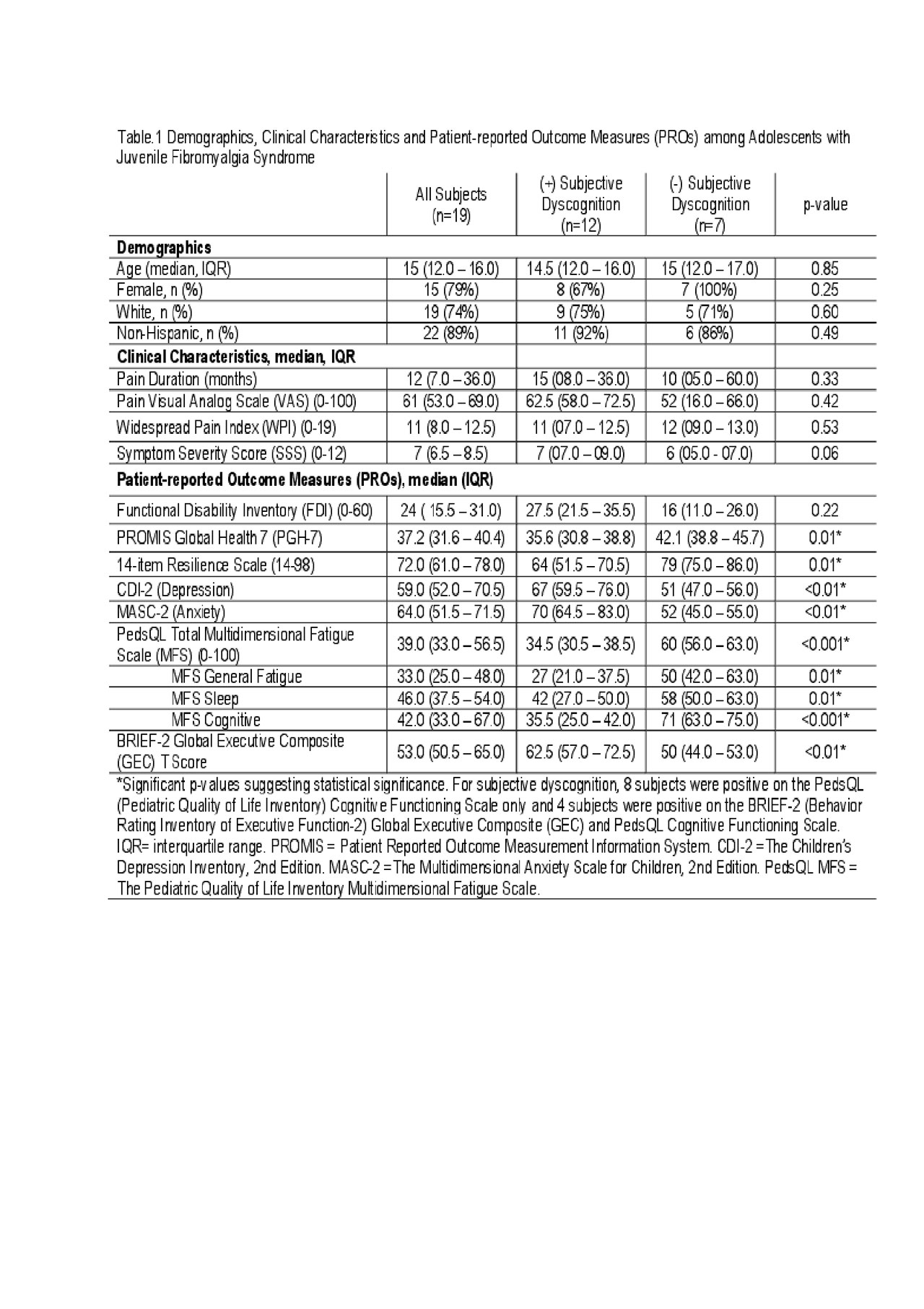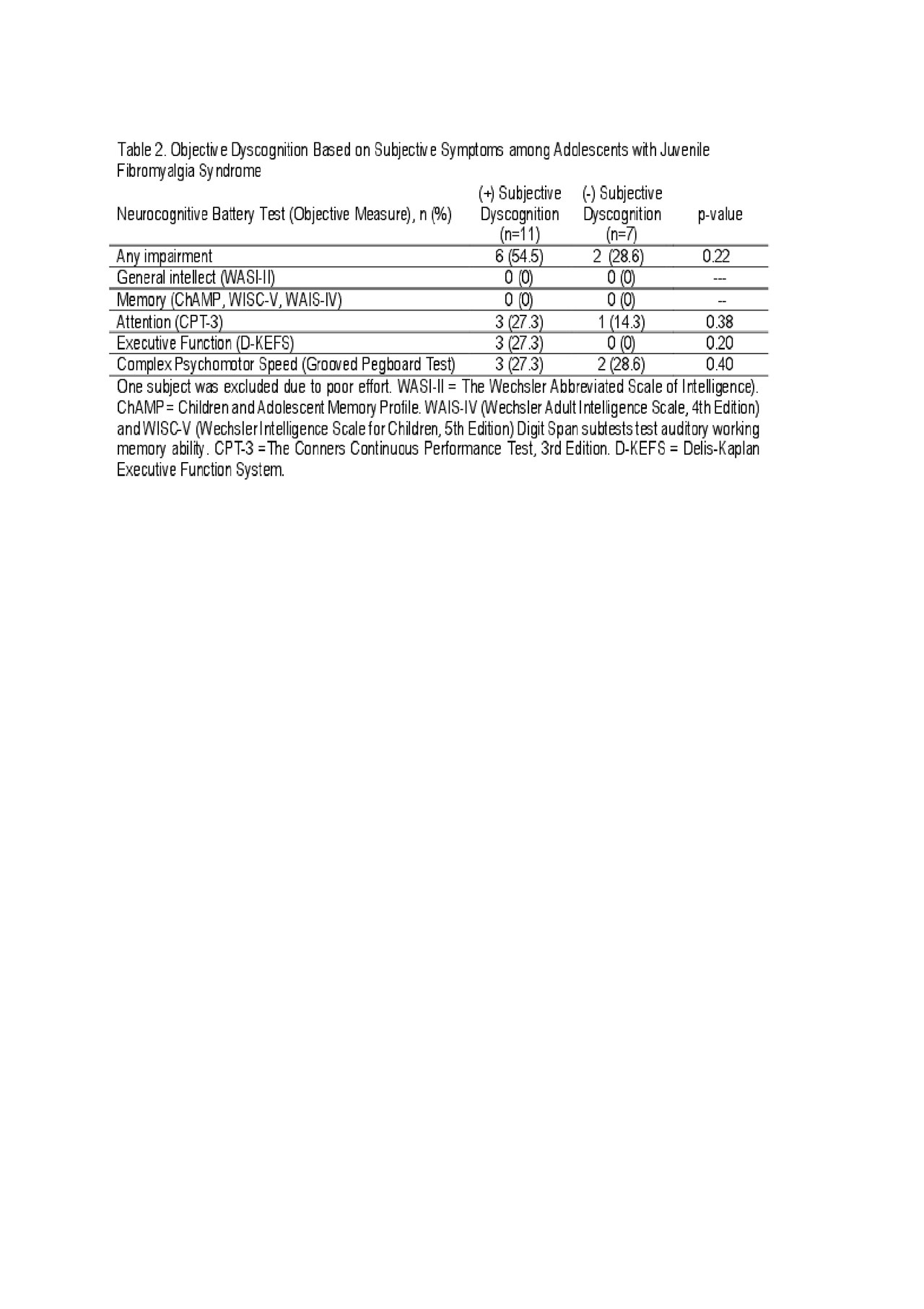Session Information
Date: Tuesday, November 12, 2019
Title: Pediatric Rheumatology – ePoster III: Systemic JIA, Fever, & Vasculitis
Session Type: Poster Session (Tuesday)
Session Time: 9:00AM-11:00AM
Background/Purpose: Dyscognition, including loss of mental clarity and problems with attention and memory, often affects adolescents with juvenile fibromyalgia syndrome (JFMS). Our understanding of this neuropsychological symptom, however, is limited. It is unclear whether adolescents with JFMS experiencing subjective (or self-reported symptoms of) dyscognition have objectively measurable neurocognitive deficits. We aimed to determine 1) the prevalence of subjective and objective dyscognition and 2) the association between subjective and objective dyscognition among adolescents with JFMS.
Methods: We conducted a pilot, prospective cohort study of children ages 12-17 years diagnosed with JFMS according to 2010 ACR criteria for fibromyalgia syndrome seen in a pediatric rheumatology pain clinic from July 2017- February 2019. Exclusion criteria included non-English speaking patients, use of stimulant medication, or a condition precluding completion of assessments. Subjects completed both patient-reported outcomes (PROs) and neurocognitive testing. Subjects with poor effort based on the Memory Validity Profile (MVP) or Medical Symptoms Validity Test (MSVT) were excluded from objective dyscognition analyses. Subjective dyscognition was defined as a Pediatric Quality of Life Inventory (PedsQL) Cognitive Functioning Scale score ≤50 or self-reported Behavior Rating Inventory of Executive Function (BRIEF-2) global executive composite (GEC) score ≥ 70. Objective dyscognition was defined as impairment of more than two standard deviations in any of the domains in the neurocognitive battery. We assessed the association of clinical signs and symptoms with the presence of subjective dyscognition using Fisher-Exact test or Wilcoxon-rank test. The association between subjective and objective dyscognition was analyzed via Fisher-Exact test.
Results: Nineteen subjects met criteria and completed the study. Most subjects were female (79%), non-Hispanic (89%) and Caucasian (74%) (Table 1). Median age at enrollment was 15 years (IQR: 12.0-16.0). Sixty-three percent (n=12) of subjects reported subjective dyscognition and 44% (8/18) had objective dyscognition in ≥ 1 domain. Subjective dyscognition was associated with greater symptoms of anxiety, depression, lower resilience, lower health-related quality of life, greater fatigue, and poorer sleep (all p< 0.05; Table 1). The neurocognitive battery domains most commonly impaired included complex psychomotor speed (28%), attention (22%) and executive function (17%) (Table 2). The presence of subjective dyscognition was not significantly associated with objective dyscognition (all p > 0.05).
Conclusion: Sixty-three percent and 44% of adolescents with JFMS had subjective or objective dyscognition, respectively. Subjective dyscognition was not associated with objective dyscognition. This discrepancy may be due to the exacerbation of subjective dyscognition by co-morbid depression, anxiety and/or fatigue. As this study is ongoing, we anticipate that analyzation of additional data will help explain this discrepancy and also guide evidence-based recommendations for neuropsychological testing for JFMS.
To cite this abstract in AMA style:
Gmuca S, Sonagra M, Xiao R, Mendoza E, Miller K, Thomas N, Weiss P, Sherry D, Gerber J. Subjective and Objective Dyscognition in Adolescents with Juvenile Fibromyalgia Syndrome [abstract]. Arthritis Rheumatol. 2019; 71 (suppl 10). https://acrabstracts.org/abstract/subjective-and-objective-dyscognition-in-adolescents-with-juvenile-fibromyalgia-syndrome/. Accessed .« Back to 2019 ACR/ARP Annual Meeting
ACR Meeting Abstracts - https://acrabstracts.org/abstract/subjective-and-objective-dyscognition-in-adolescents-with-juvenile-fibromyalgia-syndrome/


